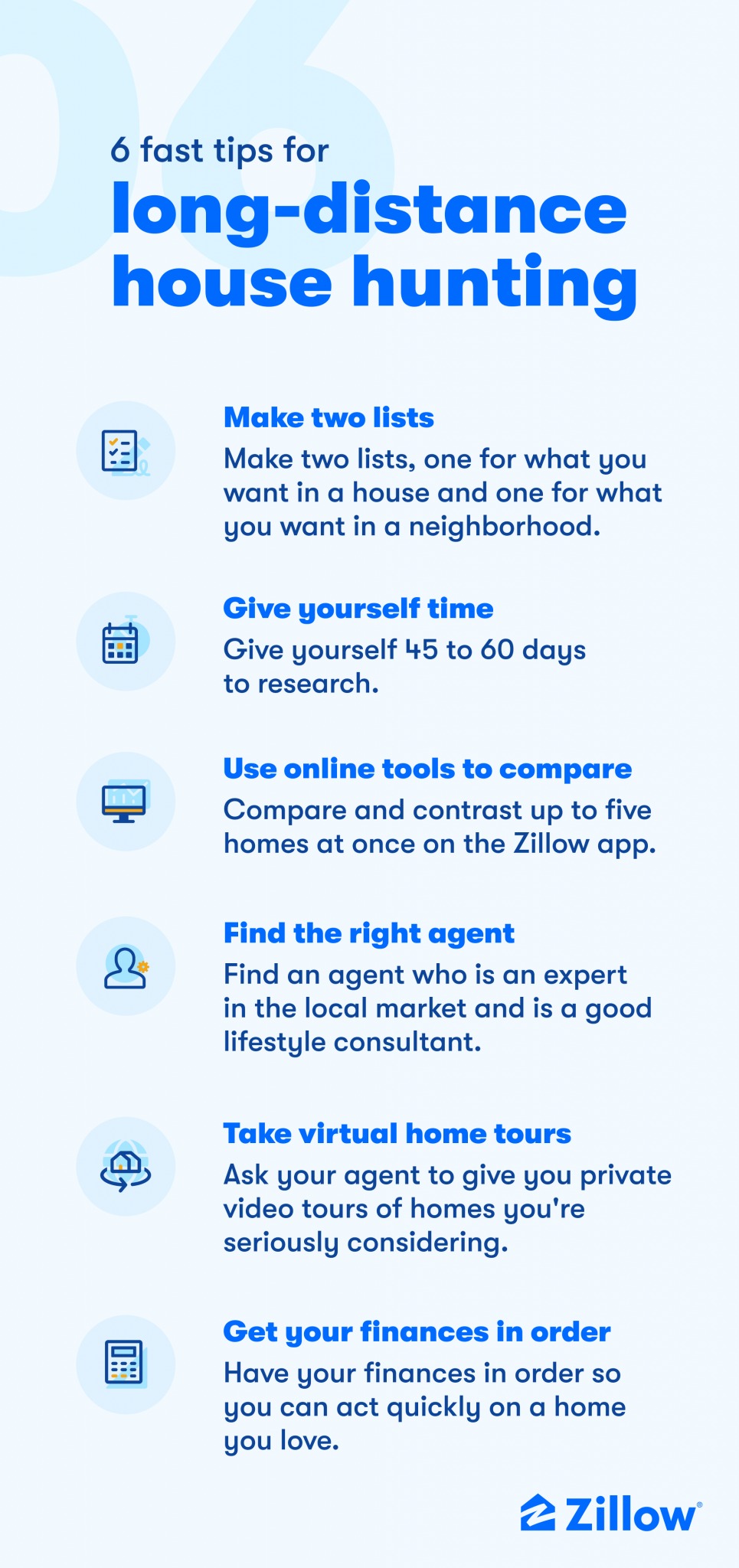From handling inspections to finding an agent, here’s what you need to know to make long-distance house-hunting less complicated.

Maybe you’ve been asked to relocate for a job. Maybe you’re looking to retire in another state. Or you’re thinking about getting a vacation home. Whatever your reasons, if you need to buy a house in another state, the process can be daunting. But there are ways to prepare so that something messy can become something manageable. You’ve got this.
1. Make a list — or two — of needs and wants
Just as you would if you were purchasing a house in your hometown, sort out what you like and don’t like about where you already live to help you determine what you’ll want elsewhere. Make two lists, one for a house and one for a neighborhood. “Some people want acreage, some want accessibility to public transportation or to nightlife or the ability to walk to the grocery store,” says Erin Catron of Erin Catron & Company in Tulsa, Okla. “Understand your needs, what you want to achieve and what you’re looking for.”
Having all this information on hand is really important for your real estate agent, Catron says. “The more prepared you are and the better you can communicate your needs to your agent will directly affect your happiness with the end result.”
2. Increase your knowledge base
Give yourself at least 45 to 60 days from when you want to move to research homes and neighborhoods, Catron says. You’ll want to plan to do a chunk of this research remotely.
“In our area … those moving here from out of state don’t travel back and forth a lot,” she says. She directs her long-distance clients to online sites from chambers of commerce and individual city sites, and to tools such as AARP’s Livability Index. Here, you can explore and compare more than 200,000 communities on topics such as the environment, civic engagement, health access, job opportunities and transportation.
Brett Jennings, founder/broker at Real Estate Experts in Silicon Valley, sends clients looking to relocate to “inbound or outbound” websites — in his case, one specific to the San Francisco Bay Area. “It indexes a lot of major relo destinations and shows typical home prices, property taxes and cost of living comparisons. It gives us an opportunity to provide an analysis for our clients.”
Once you hone in on a specific neighborhood, you can compare homes using Zillow’s Homes to Compare tool, which lets you see up to five homes side by side and keep notes on what characteristics you like best.
Take your research to the next level by joining online communities and neighborhood groups to get tips from locals. Network with friends and family to find locals to ask questions about the area. And seek out local newsletters. In her market, Catron hosts the Tulsa Life podcast. She interviews mortgage experts, college students and transplants to the area. “We talk about what’s trending and what’s going on locally.”
3. Find a local agent who is “a good lifestyle consultant”
The best way to find out what it takes to buy a house in another state is to find a great real estate agent — one who is “a local market expert as well as a good lifestyle consultant,” Jennings says. “Find someone who will ask you about things you like and about your interests so they can consider things you might not look at.”
When he’s helping a client purchase a home in another state, he says, “we go to Zillow’s Find an Agent site. It’s a great resource. With the platform, we can see which agents are doing a good amount of business. It’s not just for real estate agents to use; it’s also a consumer-facing tool.”
Those buying in another state often ask whether they need a relocation specialist. Jennings says that if you’re “looking to rent as opposed to purchase, a relo expert might provide deeper resources for rentals. But in some states, it’s quite common to find someone who handles both rent and purchase deals.”
Knowledgeable agents will come in handy all the way through your home-buying process. “A good agent will have suggestions or reviews from past clients when it comes to things like inspections and title companies,” Catron says.
4. Ask your agent for a virtual tour
Many homes for sale offer Zillow 3D Home Tours, but if you’ve picked a real estate agent, ask them to do a private video tour with you, suggests Catron. “We use our phones to do an interactive tour and give a private link to people. Buyers can say, ‘Show me behind that door,’ or ‘How close is that toilet to the closet?’ If the client were with me, what doors would they need to look behind?”
If the market is tame enough and you have the time, set aside a travel budget to visit in person. “Narrow your search to your top three and have a half-hour interview with a local expert,” Jennings suggests. “But if you’re going to spend your next chapter in a city, spend some time there. Rent for six to 12 months to get a feel for a community.” Jennings adds that if home prices are rising quickly, you may have less time to act, but in a cooling market, there’s generally less urgency. “You should take time to see where you want to land.”
5. Have your finances in order
Financing is the biggest indicator of how quickly you can move on a house and how strong your offer will be. Cash buyers need proof of funds, and those who will carry a mortgage need to show pre-approval, Catron says.
Lay the groundwork to act quickly, but talk to your agent to understand what your timeline should look like because market conditions can change. For example, Jennings says, “In Santa Clara County, the median number of days for a home on the market is 42. A year ago, it was seven to 10 days.”
And while there aren’t many differences in state regulations regarding closing and escrow requirements, Catron says it’s important to have a solid understanding of the overall transaction process where you want to buy. You want to choose a lender who can help you determine the best loan for your situation, as well as one that can give you clarity on the closing process in your closing state.
The more prepared you are, the more likely you can take advantage of an opportunity to put in a “pre-offer” on a home. “Once a listing goes up, you can get a Zillow® alert, call your agent and put in an offer before even seeing the house,” Catron explains. “Depending on motivation, needs and time frame, it may be beneficial to have a pre-offer to make sure you secure the home you want.”
6. Consider an ‘as is’ offer
Another good strategy if you’re buying out of state and unable to see the home in person before making an offer: add an inspection contingency. “If you’re making an offer and want to make it as compelling as possible, ask your agent for advice on making the offer ‘as is with the right to do inspections’,” says Catron. This popular strategy ensures a buyer has the right to do inspections but waives the right to request repairs. “Be sure you know and understand what this means within the parameters of each state contract.”
For Catron’s clients in Oklahoma, a buyer with this contingency can cancel the contract if the home doesn’t meet their expectations after inspections.
Many out-of-state buyers will travel to the home for the inspections, while others will review the inspection report remotely for vital information. If the buyer is not present at the home inspection, Catron highly recommends a video call with the inspector to review the findings.
7. Have a plan B
However you approach the process, have a plan B in case you get rejected, which can be particularly frustrating if you’ve spent money to travel to the new location. There are many creative ways to win an offer on a house; ask your agent what strategies might work best for the market you’re searching in. For example, Jennings says, “it can be a helpful strategy to put in a backup offer on a contingent house.”
Having a backup offer in place would mean you’re next in line for the house should the first buyer back out. “With the market as it is, cancellations of contracts happen more frequently than in the past,” Jennings says. “In the Bay Area, we used to see about 4% of contracts cancel; now the number is as high as 10%. This is due to the market cooling and interest rates rising or some people getting laid off after putting in their offer.”
Other ideas? “Ask your agent for off-market or coming-soon opportunities,” Jennings says. “Or find a builder with new construction inventory. Sometimes builders only put a few houses on the market at a time and may have others.”
Buttoning it up
For the most part, closing and home inspection can be handled remotely. You can e-sign most documents, and if physical signatures are needed, your agent will act as a liaison and get you all the paperwork you need ahead of closing. Finally, in most states, if you need one, you can get access to a mobile notary who can come to your home or place of work.


